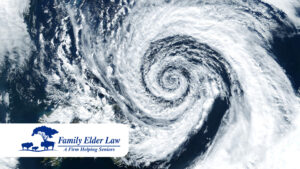We know firsthand how damaging a hurricane can be to you and your family. No matter how prepared we are, sometimes the unexpected can happen. From loss of power and downed trees to lack of communication with loved ones and mandatory evacuations, there is so much to manage during a hurricane warning.
When it is clear that your area is in the path of an oncoming hurricane, you need to quickly decide if you are going to leave your home and relocate to a safer area, or stay and ride out the storm.
Sometimes, you will not have a choice. Public safety officials are not averse to issuing blanket evacuation orders that could affect tens, if not hundreds, of thousands of people. But whether you choose to evacuate on your own volition or are forced to, one thing to consider is what do you need to have in order to stay safe? For both Florida seniors and those with special needs, advanced planning is needed to provide not only a safe place to ride out the storm but for the additional necessities they may need such as reliable access to medicine and service animals.
We know that you may need tips and resources on how to prepare. Let us share with you some top advice from around the nation right here!
1. Get the information you need from Ready.Gov! With a handy hourly preparation checklist you can get the information you need right here.
2. If you are in the path of a hurricane, do not wait to find the evacuation path and shelters closest to you. You can learn more about shelters and information in your area on the Red Cross website here.
3. Need ideas on how to prepare your home? What you should secure? Trim trees and secure outdoor furniture to prevent potential hazards. Learn more from the National Safety Council here.
4. Be sure your emergency contacts know what you plan to do. Be sure your emergency contacts have your current phone number and address. Share your hurricane plan with them, so they know where you will be in case of evacuation.
5. Take a minute to make sure you are financially prepared. You want to have cash on hand, as ATMs and credit card systems may be unreliable during power outages. Be sure you have access to funds for essentials.
6. Plan for medication supplies. Be sure you have a sufficient supply of medications to last through the hurricane and its aftermath. Speak with your healthcare provider about emergency medication refills if needed.
7. Plan for any and all special needs, as well as service animals. If you have specific medical needs, communicate them with your healthcare provider and caregivers. Prepare medical equipment, assistive devices, and any necessary supplies. If you are told to evacuate, take what you need. It is not safe to leave behind things that are crucial to your wellbeing such as your medication or your service animal.
8. Make sure your important documents are secure. Gather and protect vital documents such as identification, insurance policies, medical records, and legal documents. Place them in a waterproof container or store digital copies in a secure online location. If you need more help, ask your Florida estate planning and elder law attorney what you should and should not take with you.
We know this article raises more questions than it answers. Our firm is here to support you now and available to answer your questions. No matter where you are in life’s journey, we can help. The most important thing is to protect yourself and those you love. Whether you need to update your estate plan, are preparing for future long-term care needs, or have a loved one entering or already in a nursing home, we are ready to assist you. We have three convenient locations and are ready to serve the communities around Highlands and Polk County, Florida. Take your first step by contacting us today.






